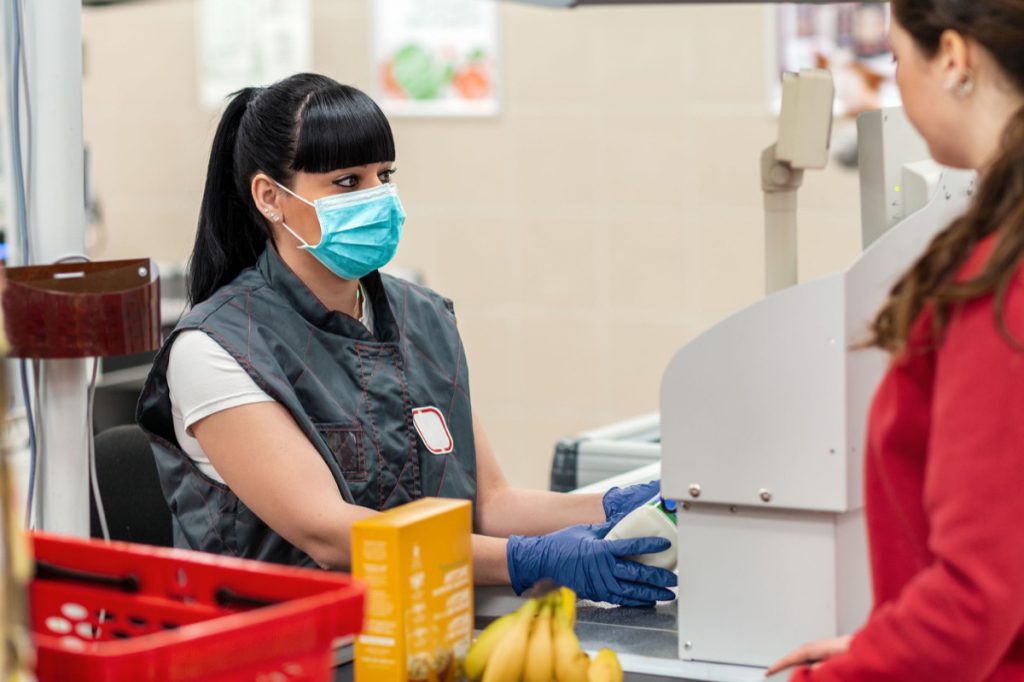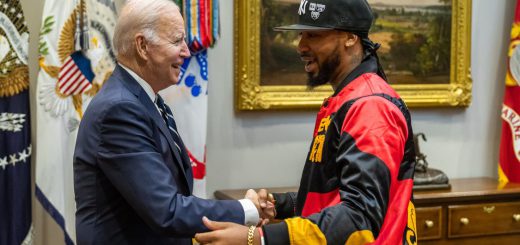Front-Line Workers: COVID-19 Should Reaffirm Our Expectations for Safe Workplaces

Ken Green
CEO/Founder
UnionTrack
The front-line workers who are keeping America’s economy afloat are putting their lives at risk every day during the COVID-19 pandemic. Most nations have accepted this as a necessary measure.
“Protecting public health and the economy during the COVID-19 pandemic demands that residents stay as far away from each other as possible,” write Brookings Institution researchers Adie Tomer and Joseph W. Kane. “Yet to make this collective response possible, tens of millions of people must continue to work, often outside the home.”
Because these workers are considered essential, they are at an increased risk of exposure to the novel coronavirus. In fact, it’s almost as if people expect them to be at work, regardless of the risk to their personal safety.
For example, how many people are protesting to get grocery stores to close because worker safety is more important than unrestricted access to food? How many people have been willing to stop online shopping so packaging workers and truckers can stay protected? Very few, if any, are advocating this side of the “to work or not to work” equation.
This begs an important question. Were there assumptions (implicit or explicit) of bodily harm and injury in some non-healthcare workplaces (by employers, employees, and/or the public) before the COVID-19 crisis struck?
The simple answer for a lot of these workers seems to be “yes.”
The Safety of Essential Workers Before and During COVID-19
Unfortunately, employers don’t always operate with employee safety as a priority. Many employers accept a premise that workers must assume risk to get the job done at all costs.
Truck drivers for the large carriers are expected to work in unhealthy conditions. Activist and writer Joe Allen shares that in January 2019, a FedEx driver died at a distribution center in East Moline, Illinois, while working during a polar vortex that saw temperatures drop to 33 degrees below zero. Allen notes that UPS drivers and USPS carriers were also required to report to work during the record storm.
In 2016, a UPS driver suffered a heat stroke after delivering packages all day in a truck with no air conditioning, where the internal temperature can easily reach 120 degrees on a 90-degree day. “Bottom line is, I was that close to being dead,” driver Jim Klenk told NBC News reporters Lisa Riordan Seville, Adiel Kaplan, Kenzi Abou-Sabe and Cynthia McFadden.
“Our workload is increasing and we’re still expected to get done faster,” a driver in Kentucky told the NBC News reporters.
Quotas run the show at Amazon warehouses. The company’s dominance is based on its ability to meet short delivery deadlines, which require high production flow in fulfillment centers. Former employees claim that hitting quotas is the top priority of Amazon managers, no matter the cost to workers.
A 2019 investigation by Reveal from the Center for Investigative Reporting shows that from just 23 of the 100 fulfillment centers in the U.S., the rate of serious injury is more than double the national average for the warehousing industry.
“You have people who are, like, killing themselves to get stuff done and people who work through their breaks just to get stuff done,” one former Amazon fulfillment center worker tells reporter April Glaser.
That’s because workers have to break safety rules to keep up with quotas and avoid being fired, Reveal reporter Will Evans says. “For Amazon, all they care about is getting the job done and getting it out fast and not realizing how it’s affecting us and our own bodies,” former Amazon warehouse worker Candice Dixon tells Evans.
Railroad workers have seen their safety standards suffer due to heavy layoffs in the months leading up to the COVID-19 pandemic. Now, those depleted crews have become essential workers. Dennis Pierce, national president of the Brotherhood of Locomotive Engineers and Trainmen, writes that workers are expected to work through unacceptable conditions, “including dirty locomotive cabs, putting workers in poor hotels with no food, and transporting in small, four-person minivans where social distancing is nearly impossible.”
In each of these cases, worker safety is secondary to getting the job done.

Even Workers’ Compensation Laws Accept Risk
Workers’ compensation legislation even seems to promote this assumption that catching an illness at work is just part of the job for some people. H. Allan Hunt, an economist consultant at the W. E. Upjohn Institute for Employment Research in Kalamazoo, Michigan, writes that it is yet unclear whether states will consider COVID-19 an occupational disease for which workers should be compensated if they contract it on the job.
“There is a long history of limited coverage of ‘occupational diseases’ in workers’ compensation,” Hunt writes. “Many of the widely accepted covered illnesses are based on specific job-related hazards that were determined more than a generation ago—think black lung disease in miners. These diseases are distinguished from ‘ordinary diseases of life’ that generally cannot be attributed to the workplace and are therefore usually not compensable.”
Such an interpretation of workers’ compensation laws advances the idea that there is an assumption of risk of common illness when workers are on the job.
Is This Assumption Changing in the Face of COVID-19?
The COVID-19 pandemic has compelled many people to reconsider the idea of workers putting their lives on the line.
As Ronald Brownstein, senior editor at The Atlantic, writes, “The greatest irony of the coronavirus pandemic may be that many of the American workers now considered the most essential were among those treated as the most disposable before the outbreak began.”
We see this irony play out daily now. “The longer the COVID-19 pandemic has continued, the clearer it has become that essential workers do not have the rights and protections they need and deserve,” write David Madland, Sarah Jane Glynn, Jacob Leibenluft; senior fellows at the Center For American Progress; and Simon Workman, the director of Early Childhood Policy. Nor do many have a strong enough voice at work to demand a change in the expectation that they are willingly assuming risk at work, note the authors.
Things might be changing, however. Many workers are filing complaints with states’ Departments of Labor, ProPublica reporters Michael Grabell, Bernice Yeung and Maryam Jameel write. Some 90,000 people have signed an online petition, sponsored by Daily Kos, the AFL-CIO, and other groups, calling for Congress to pass legislation providing them with protections and compensations. Union members, too, are turning to labor leaders to stand up and negotiate for them in the workplace.
These efforts are getting the attention of legislators and employers alike, sparking conversations that will impact labor dynamics long after COVID-19.
What Advocates Are Doing Now to Support These Workers
Labor advocates are doing what they can to reward front-line workers who are working in more hazardous conditions. Their efforts are centered on expanding health and safety protections in tandem with winning hazard pay for those workers.
Both are essential components of a pandemic response because to have one without the other continues the assumption of risk by the workers who should be better protected, writes Brian Callaci, postdoctoral scholar at the Data & Society Research Institute.
Unions have been front-and-center in the fight for better protections and pay for front-line workers. Some of the wins for workers include the following:
- The United Food and Commercial Workers union secured additional pay and benefits for 60,000 workers as insurance against future unemployment. “These wage and benefit increases will not only protect the health and welfare of these hard-working men and women, they will help ensure all of America’s families have the food they need to overcome the public health crisis our nation faces,” says UFCW International President Marc Perrone.
- The International Brotherhood of Teamsters reached an agreement with UPS on paid leave benefits and safety regulations for drivers during the COVID-19 pandemic.
- Multiple unions have pushed for federal regulations that increase the production of PPE for front-line workers under the Defense Production Act. “The federal government should be ‘laser-focused’ on making sure supplies of equipment are adequate,” says Patrick Carleton, president of United Steelworkers Union Local 4-9 and vice president of the Maine AFL-CIO.

The Battle for Hazard Pay
Unions continue to apply political pressure to secure hazard pay for essential workers.
As Isabel Soto, labor marketing policy data analyst at the American Action Forum, explains, essential workers who are expected to work through the pandemic have received little in the form of financial support. Yes, the Coronavirus Aid, Relief, and Economic Security (CARES) Act provided funds for those claiming unemployment, but it did not address essential workers, Soto explains.
That’s why lawmakers and advocates have been lobbying so hard for essential workers who, while putting themselves at risk, are being overlooked for benefits. “Hazard pay is the least we can do to compensate them for the risks they face,” Molly Kinder at The Brookings Institution writes. Here are some efforts being made to address the issue:
- Pandemic Premium Pay Fund (Heroes Fund). U.S. Senate Democrats have introduced a proposal to pay front-line workers $25,000 above their regular wages, among other protections.
- Patriot Pay. Sen. Mitt Romney introduced a proposal for essential workers to receive a pay raise of up to $12 per hour for the three-month period of May, June and July 2020.
- Coronavirus Frontline Workers Fair Pay Act. U.S. Rep. Matt Cartwright introduced a proposal that would provide hazard pay of $18.50 per hour (capped at $35,000) to high-risk healthcare workers and $13 per hour (capped at $25,000) for other essential workers.
Through these efforts, public officials are making a statement that the working conditions and expectations for these workers during COVID-19 have been unacceptable, and further compensation is the first step in writing those wrongs.
The next step, then, is to ensure that no precedent is set for low-paid workers to be considered front-line fodder for the next public health crisis. When the next contagion arrives, things like PPE, safety protocols and hazard pay must already be in place so that essential workers don’t have to sacrifice their health, or the health of family members, to collect a paycheck.
Images by: steklo/©123RF.com, dolgachov/©123RF.com, Kiattisak Lamchan/©123RF.com







